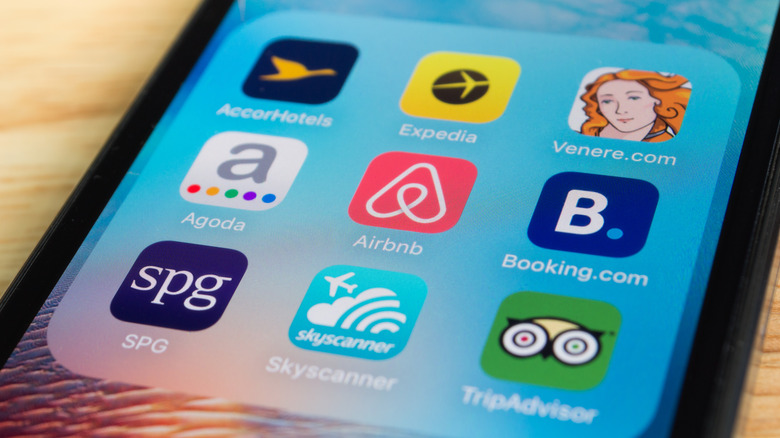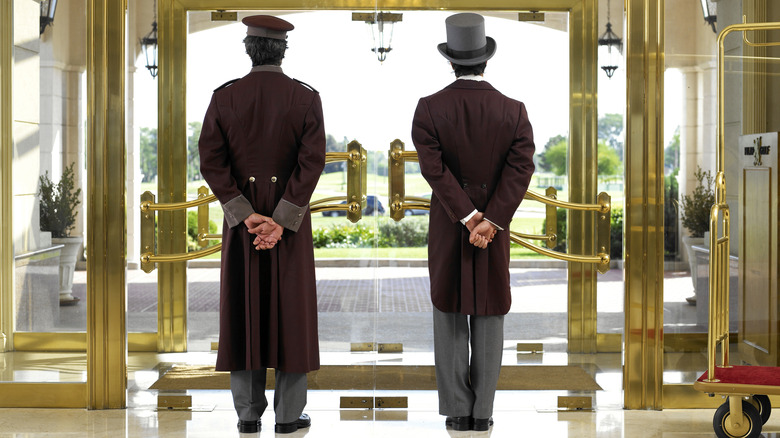The Dirty Trick Hotel Booking Websites Use To Get Us To Make Reservations
Imagine going into the store to buy something and seeing that there's only one of that item left on the shelf. Now, imagine a salesperson at the store leaning in behind you and urging you as strongly as possible to buy that product before it's too late. It's not so different when you're booking a hotel through an online travel agency, and you start seeing messages about how there's only one room left at a given price. On the one hand, sites like Travelocity, Priceline, Orbitz, and Hotwire can be useful for surveying the best prices offered by different hotels. On the other hand, researchers have found in the past that these same sites may use a little sales trickery to misrepresent how few rooms are really available.
In 2019, the nonprofit organization Checkbook.org made headlines with a study it conducted into the artificial shortage of hotel rooms shown on travel booking sites. The organization, which aims to help consumers make informed spending decisions, found a pattern of deceptive marketing among some of the most-visited online travel agencies. This includes Booking.com, Expedia, Agoda, and Hotels.com, all of which receive millions of monthly visits.
Checkbook's executive editor, Kevin Brasler, told NBC News BETTER, "Almost all these warnings about low availability, about scarcity of rooms, are completely misleading and dishonest; there's usually still plenty of rooms left. It's just the way [those sites are] trying to get you to buy now and not think about it too much."
How hotel booking sites operate
It's worth remembering that booking sites aren't just there to show you the best hotel deal out of the goodness of their hearts. They're there to make money, just like hotels are, and in fact, they receive a commission from the hotels they promote. That's just one reason why their tactics have sometimes raised red flags among regulators like the Competition and Markets Authority in the UK. When a site boosts a hotel in its search results, showing you that there are only one or a few rooms left and that other people are looking at it, they have a vested interest in getting you to book that room. The only problem is that the low, low price they're advertising might be for a highly specialized room type, one that's only technically the "last" available.
Checkbook's study, which incorporated 80 searches across multiple sites over three weeks, notes one example where a Hilton-owned hotel in Las Vegas appeared to have only room left on Agoda. Upon closer examination, there were many other rooms available at the same rate, and it was only the "1 King Accessible Roll In Shower Studio Non-Smoking" room that was almost sold out. Priceline, likewise, advertised a whopping 23 hotels in Minneapolis as having only one room left, when really, many of those properties still had other rooms available. In this way, online travel agencies can trick you into thinking you've lucked out and found a discounted room that's almost gone.
Shopping around the right way
The same company, Expedia Group, owns Hotels.com, Travelocity, Hotwire, Orbitz, and of course, Expedia. Booking Holdings, meanwhile, owns Booking.com, Priceline, and Agoda. So, while it might seem smart to shop around and do separate searches — comparing prices between Hotels.com and Expedia, for example — both those sites are still ultimately under the umbrella of one big tech company.
Expedia Group and Booking Holdings also own Kayak and Trivago, respectively. These two sites were among the few that Checkbook's study determined to be less guilty of flashing warnings like "Only 1 Left!" However, if you really want to shop around, and you're worried about missing out on a good hotel deal, you can also try to game the system (even as it's gaming you) by booking a refundable room. It's the same principle that the U.S. Department of Transportation advises for using the 24-hour rule to your advantage when booking your next flight.
Even if you take booking sites at face value when they show you a dwindling number of hotel vacancies, it doesn't hurt to reserve a refundable room and then continue comparing prices. If you find a better deal, you can always go back and cancel the first reservation. You might also consider checking prices directly with the hotels on their websites. That way, you're not acting on impulse and blowing your vacation money on a nonrefundable room just because an online travel agency was pressuring you and working extra hard to earn its commission.
Think twice and maybe put it back on the shelf
Returning to our hypothetical store situation — with the salesperson getting in your ear and coercing you to buy the last item on the shelf — the natural response for some shoppers might be to panic and grab that item before someone else gets it. What you might miss after you leave is the sneaky salesperson restocking the shelf with a similar product ... just before another customer enters the store and the salesperson repeats their high-pressure pitch.
Some hotel booking sites may operate like this, suggesting that rooms are in high demand and selling like hotcakes, so you'll commit to reserving one ASAP. According to Kevin Brassler (via Bottom Line), even certain hotel chains use the same trick, so it's not just third-party sites that are out there doing it. Just picture them as pushy salespeople, look for red flags when booking a hotel, and be careful when they tell you, "It's on sale, but this is the last one!"
It's true that cities like Minneapolis and Las Vegas host conventions, where rooms may run out as local hotels fill up with even more out-of-towners than usual. You may also encounter peak travel periods in other places, such as cherry blossom season in Kyoto, Japan, when hotels tend to be booked solid months in advance. At the same time, by exploiting the refund option when it's available, you can always make a tentative hotel reservation until you find a better option.



